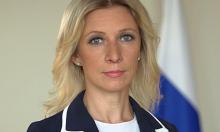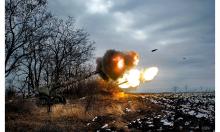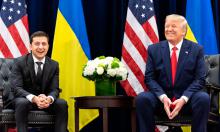NATO Enters The Afghan Mire
 Bosnia, Kosovo and now Afghanistan - the area of NATO's peacekeeping missions has been enlarged to include those countries that remain the bulwark of Islamic terrorism.
Bosnia, Kosovo and now Afghanistan - the area of NATO's peacekeeping missions has been enlarged to include those countries that remain the bulwark of Islamic terrorism.
On Monday, a ceremony to place the International Security Assistance Force (ISAF) in Afghanistan under NATO command was held in Kabul. The presence of Afghan Prime Minister Hamid Karzai and UN Deputy Secretary General Alessandro Minuto Rizzo emphasised the event's importance.Bosnia, Kosovo and now Afghanistan - the area of NATO's peacekeeping missions has been enlarged to include those countries that remain the bulwark of Islamic terrorism.
On Monday, a ceremony to place the International Security Assistance Force (ISAF) in Afghanistan under NATO command was held in Kabul. The presence of Afghan Prime Minister Hamid Karzai and UN Deputy Secretary General Alessandro Minuto Rizzo emphasised the event's importance.
Indeed, for the first time in its 54-year history, NATO has left its traditional theatre of operations, Europe, to establish order. The North Atlantic alliance has assumed command of the 5,000-strong international force, formed after the adoption of a UN decision in December 2001, from Germany and the Netherlands. They led the military contingent in the past six months, while prior to them the ISAF forces were commanded for half a year by Britain and Turkey.
It may seem to some that the appearance of the NATO command changes little. After all, 90 percent of the International Forces already came from NATO member states, while the contributions of the remaining 14 of the 29 countries taking part in the ISAF were mostly symbolic.
Nonetheless, NATO itself is inclined to regard its emergence in Afghanistan as a new era in the bloc's history. Originally set up after World War II to fight communism, NATO has decided that now it is time to target international terrorism. In this way the alliance hopes to ease the sense of its own inaction, and even pointlessness, which has been haunting it since the break-up of the USSR.
NATO's involvement in the ISAF mission reflects its policy of transformation and the alliance's intention to respond to the new threats to security in the 21st century, said an official NATO statement.
We are told that NATO is switching from defence to an offence. It is jumping out of Europe to global vistas.
Meanwhile, the ISAF peacekeeping zone will remain as it was, i.e. extremely narrow. It does not cover the whole of Afghanistan, nor even a region of Afghanistan, but only one city - Kabul. The task of the international forces will still be limited to maintaining stability in the Afghan capital and trying to prevent terrorist attacks there. Despite the desperate requests from the Karzai government to enlarge the zone over the entire country, the alliance made it plain that it was not going to demand a change of the UN mandate. So the zone covers Kabul and nothing more.
So what is happening throughout Afghanistan, which in fact has been left by the United States to the mercy of fate after its formal victory over the Taliban, seems to be of no concern to NATO.
But something extremely alarming is going on there. The country's territory has been divided up into pieces controlled by local tribal leaders and field commanders who are only happy to shoot each other. The Taliban itself is alive and kicking, multiplying rapidly. The vast lands along the southern and eastern borders with Pakistan remain the seats of guerrilla warfare against the collaborationist authorities, as they are called there.
Is it possible to speak about the success of the U.S. military operation in Afghanistan and hope that NATO will consolidate its success through peacekeeping actions in Afghanistan? Can we hope for this while Kabul remains only a tiny island of tranquillity in a land that is enveloped in permanent internecine strife, elements hostile towards the West and terrorists multiplying like locusts?
NATO commanders should realise that Kabul is not Kosovo, and not Bosnia.
The Balkans are closer to "home" for the alliance, and the infrastructure there is incomparable with that in Afghanistan, which is practically is non-existent. In remote and impoverished Afghanistan, surrounded by land on all sides, all military supplies and supplies are delivered by air. We should add the ethnic discord dividing Afghans, the country's conservative culture, which is incomprehensible for Europeans, and the incessant threat of terrorism. The explosion of a taxi driven by a suicide terrorist in Kabul, which killed 4 German peacekeepers and wounded 31, is unlikely to be the last.
Against this sombre background, the new meaning of NATO's existence - and the peacekeeping mission in Afghanistan is being presented precisely in this way - may prove to be a quagmire from which it will be impossible to get out without incurring losses.
Vladimir Simonov, RIAN
Subscribe to Pravda.Ru Telegram channel, Facebook, RSS!




